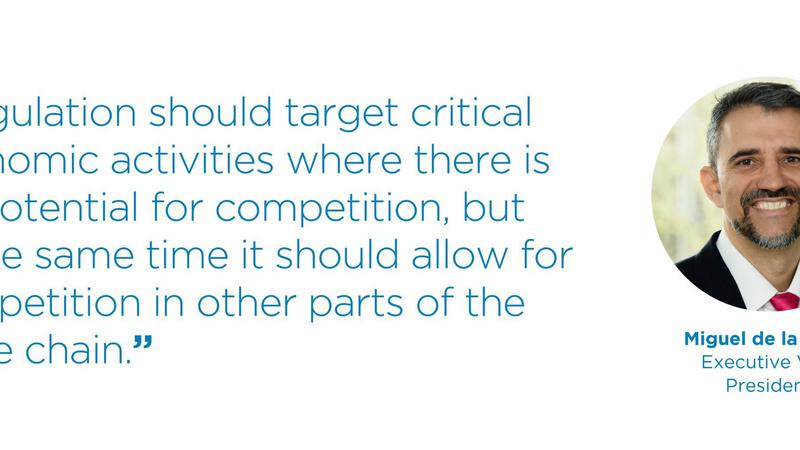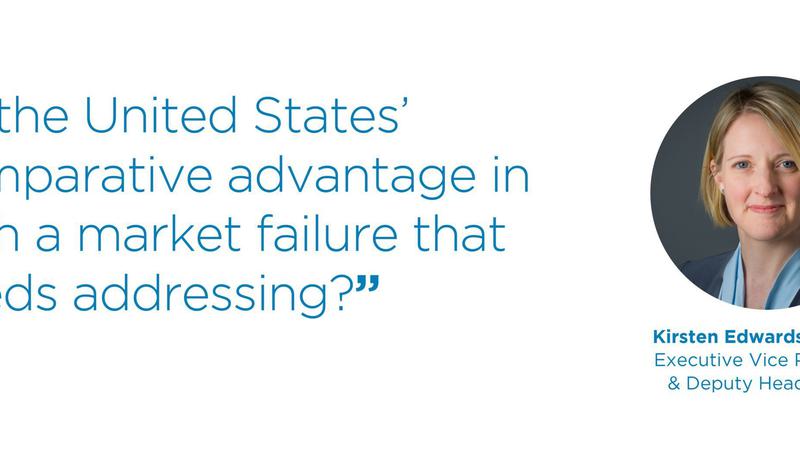Competition Policy and Industrial Policy

Share
Urs Haegler joined speakers from the European Commission, King's College London and Freshfields on a panel during the 2021 Innovation Economics conference to discuss industrial policy and competition policy in the EU and the UK.
Urs spoke about the interaction between industrial policy and competition policy as well as the conduct of industrial policy from an international trade and investment angle. He began by pointing out that industrial policy had been popular and widespread in the 1960s, then increasingly fell out of favor during the 1970s. At the time, there were
many bailouts of loss-making firms that involved lots of government support through subsidies, either to prop up declining industries or to promote national champions – a number of these interventions however turned out to be costly failures.
During the 1980s these policies were gradually replaced by a more market-oriented approach and economic
liberalization. However, we are now witnessing a reverse swing, with industrial policies’ comeback and the appetite for more government. In the EU, this is visible in the field of State aids and merger control. It is being argued that EU State-aid rules are too restrictive, prevent sufficient funding for innovative activities, or more generally the pursuit
of other public policy objectives. As an example, the Commissioner for the Internal Market recently announced that he wishes to see huge investments in the European semiconductor industry as this would benefit especially the car industry and help it promote, e.g., connected driving.
In merger control, on the other hand, one remembers the widely debated reaction by the French and German governments to the prohibition of the Alstom/Siemens transaction in 2019. Their manifesto extended their intense lobbying that already happened during the Commission’s investigation, demanding merger control should not stand in the way of creating European champions, especially in the face of formidable Chinese companies competing with them. At the same time, the same governments called for more stringent antitrust enforcement and for tighter merger control though it is not clear whether they would take the same position if some of the “GAFAMs” were European companies. Antitrust practitioners have been skeptical towards these arguments, fearing that they may bring even greater politicization of competition enforcement.
The proposed Digital Markets Act (DMA) is a further example of increased intervention in what are deemed to be “key industries”. Whilst pointing to the need for more legal certainty and speed in addressing “gatekeepers'” market conducts, it is not clear whether these two objectives will be reached through the DMA – and if they were, speed
is not always a guarantee for good outcomes, as economics on these questions are complex.
Regarding the topic of trade defense measures, the Commission made clear in recent publications that it does not think that competition rules are the most effective tool to promote economic sovereignty and the goal of competitiveness of European firms more generally. The White Paper on foreign subsidies suggests new trade defense tools should be used to address unfair competition by state-funded non-European firms. On the other hand, there are
two theoretical justifications for government support of its domestic firms: imperfect competition - drive to support domestic players, as well as positive externalities. To be carried out properly, however, state interventions require excellent information from the government.
To react to said interventions by other countries, the WTO allows for anti-dumping and anti-subsidy measures in the form of extra import duties, but those tools may not always be effective. With its White Paper on foreign subsidies, the Commission is trying to supplement the existing toolbox with redressive measures on trade and services (including
procurement procedures). Given the current climate, one should remain aware that, according to the economic literature, policies that are designed to level the playing field may well lower the welfare of the countries that deploy them. Such measures may benefit domestic import-competing producers and industries to some extent, but they have
severe drawbacks in the form of higher consumer prices, harm to import-dependent companies and a loss of spillover effects for technology that is embedded in subsidized products. A recent empirical study by Jabbour et al. finds results that are broadly consistent with those theoretical predictions. The findings of this study, as well as general economic consensus, suggest that the shortest road to EU-based innovation and competitiveness might rather be to allow import-dependent firms to exploit the benefits of cheap imports, notwithstanding the risk of subsidized foreign
competition.
Watch the event recording:
The Innovation Economics Conference for Antitrust Lawyers, organized by Concurrences and King’s College London, took place online between 27 – 30 April 2021. All materials from this webinar are available on the Concurrences website.


